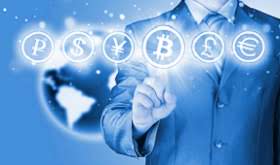Blockchains - The Most Important Invention Since the Internet Itself
08 Feb 2017

Most people have heard of BITCOIN but many have not heard of the platform infrastructure on which the currency is built – “blockchains”. Whilst the concept of blockchains and the way they work can seem complex, there is little doubt that they will be a part of the lives of every person with access to technology in a very short time.
Wikipedia describes a blockchain as:
“a distributed database that maintains a continuously-growing list of records called blocks secured from tampering and revision. Each block contains a timestamp and a link to a previous block.”
Leighton Cosseboom in his Techinasia.com article 1 simplifies the blockchain definition:
“A blockchain is nothing more than a record of online events. The ledger is public, and shared among all the different parties on a network – nodes on the blockchain. It can only be updated by consensus from a majority of the users in the system. Additionally, once entered, the history is permanent and can never be deleted, ever.…a blockchain is a highly-distributed, leaderless, jurisdictionless, identityless, nearly anonymous, decentralized architecture for managing ownership.”
So how does an online public list give rise to Bitcoin, a cryptocurrency which has no single national affiliations, which is set to potentially disrupt the banking industry. The key to the strength of the list making up the blockchain is in the near impossibility of replicating it outside of the set “mining” process by which units of each currency are generated meaning the “ownership” of amounts of the currency can be reliably and verifiably recorded without the need of a central bank. The Cosseboom article referred to above has a great diagram for the visual thinkers among us.
What about outside of cryptocurrency? Well known tech investor and founder of Netscape Marc Andreessen says the blockchain is “the most important invention since the internet itself.” Here are some of the potential uses:
-
Notary services previously carried out by specialised people (i.e. Public Notaries) in order to verify authenticity of documents can be replaced by blockchain applications.
-
Shares, stocks, bonds and most forms of intangible “digital” assets can be created, stored and traded safely on a decentralised network not relying on a nation or bank based trading platform.
-
Identity “signatures” and escrow arrangements can be created and verified for use in all types of transactions. Blockchain technology can accomplish escrow by using multi-signature transactions, which involve depositing funds to a virtual currency “wallet” to initiate a transaction between three parties – two contracting parties and a third-party ‘escrow’. This would apply to professionals such as settlement agents.
-
Land registry records can be safely and accurately stored and maintained.
-
Smart contracts can be created on platforms such as Ethereum2 allowing contracting parties to create agreements which cannot be interfered with or amended by third parties without both parties co-operation. Smart contracts could lead to legal industry changes, as lawyers are tasked with crafting or adjudicating auto-executing arrangements. The automation of contracts would reduce transaction costs by dispelling overheads as well as speed up the process for clients involved in business.
-
Voting systems can be set up so that voters can anonymously select candidates and the votes are accurately recorded and cross checked by all participants.
-
Decentralised organisations to distribute rights that mirror those of traditional organisations, such as voting or dividend rights can be created. However, liability issues as to ultimate responsibility may be difficult to define and if an organisation’s ‘management’ is automatically conducted, legal systems would have to decide “who” is responsible if laws are breached. In turn, the legal status of such an organisation may be in question.
-
Records of politicians voting on allocation of funds can be created and made publicly available increasing accountability.
-
Intellectual property (IP) ownership could be similarly recorded via decentralised ledger. Tokens representing individual sticks from the bundle of property rights could be individually transferred. Blockchain technology in this context requires doctrinal and legislative shifts. Current IP licensing law focuses on contractual relationships, not transferrable in rem property rights that could be sold downstream.
-
Patient medical data can be safely and accurately stored and maintained.
-
Insurance claims and data can be safely and accurately stored and maintained.
-
A ‘registry of beneficiaries’ under a Discretionary (family) Trust can be safely and accurately stored and maintained.
The potential uses for the blockchain are numerous and have the potential to make the world a more level playing field for everyone.
Of course, whenever there is change systems you need to understand how it happens and certify the process, work out how laws need to be changed and what new laws are needed to regulate how the new system would run. It is not just good news for lawyers but also their clients.
Unfortunately, the technology has potentially deadly uses such as the anonymous financing of terrorism and anonymous facilitation of narcotic sales.
This is not technology that can be stopped or will go away on its own. Like it or not the blockchain is already a part of everyone’s world. The debate on the ethics and rules for the various uses of the blockchain is something that thinkers the world over need to consider.
For further information contact Murfett Legal by emailing one of the following directors:
Jason De Silva (Director): [email protected]
Kelly Parker (Director): [email protected]
Peter Broun (Director): [email protected]
Download PDF
Back To Articles